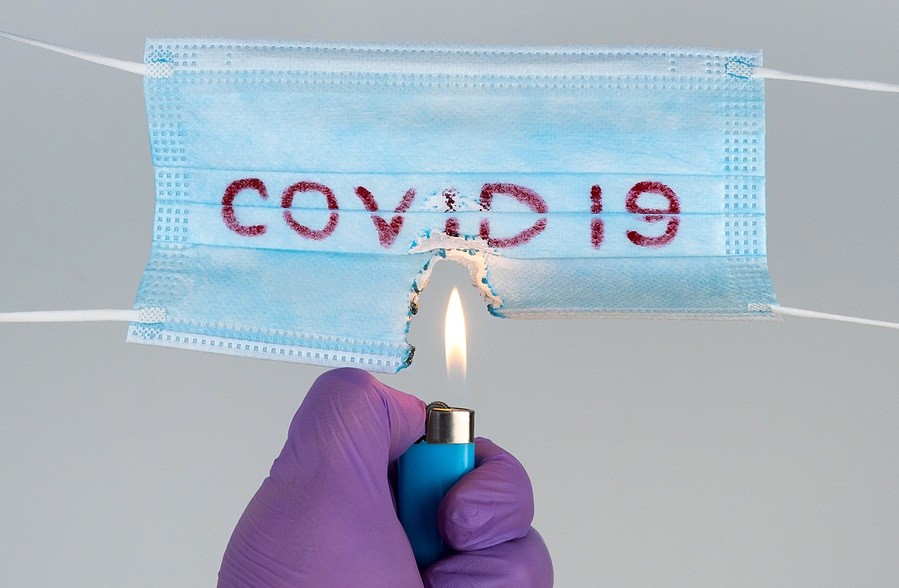Source of the image.
Comments by Brian Shilhavy
Editor, Health Impact News
Earlier this week it was announced that Norwegian shipping line Havila has become the first company to ban electric cars on its ferries, following the sinking of the ‘Felicity Ace’ ferry last year, which caused a fire from electric car batteries.
Norwegian shipping company Havila has banned electric, hybrid and hydrogen cars from entering its ferries. After a risk analysis, it was concluded that the risk to the safety of the ship’s fleet was too great. If a car starts to burn, the fire can no longer be extinguished.
The risks to ships of transporting electric cars have been discussed since the “Felicity Ace” ran aground in the Azores last February. The electric vehicles on board had caught fire. The fire could not be extinguished. Eventually, the huge ship sank with thousands of electric cars and Porsche or Bentley vehicles.
The head of the Havila shipping company, Bent Martini, said that a report by the maritime intelligence service TradeWinds according to the risk analysis, the fire of an electric car requires a particularly complex rescue operation. The crew on board could not afford this. Passengers would also be at risk. It is different with vehicles with an internal combustion engine. (Full article here.)
The Felicity Ace had 3,828 cars on board when it burned and sank, many of them high-end luxury vehicles.
[Last year], there was a cargo ship that caught fire and eventually sank in the Atlantic Ocean. Named the Felicity Ace, the ship was reported to be carrying thousands of vehicles, including European luxury cars such as Porsches, Lamborghinis and Bentleys.
But apparently, there were also some rare and irreplaceable vehicles on board the ship when it sank off the coast of Portugal. The vessel manifest was available on the ImportInfo website and we were able to confirm all the missing makes and models. Going through them all might be too much trouble, so we’ve narrowed it down to mentioning the most notable ones. Are your tissues ready?
Let’s start with the Lamborghinis. There were 50 units of the all-new Urus SUV and 20 Huracan sports cars. But perhaps the worst loss from the Sant’Agata stable was the 15 “Ultimae” Aventadors, which were supposed to be the final edition examples of the V12 supercar.
Lamborghini had already shut down the Aventador production line before the tragic incident, but they have now restarted the factory to remake the lost cars.
While the Italian sports car maker lost 85 cars, its Volkswagen Group siblings lost a total of 3,024 cars. Audi and Porsche lost 1,194 and 1,117 cars respectively, and these include more than 100 Audi e-Trons and a variety of Porsche Cayennes, Panameras and Macans. Volkswagen lost 523 vehicles, while Bentley canceled 190 units.
While not the most expensive on the list, losing a 1996 Prelude would certainly make a Honda enthusiast sad. According to its apparent owner, the 1990s sports compact was the 65th ever produced. And worse, the two-door Honda coupe had no insurance.
The staggering loss of cars was reported to be worth around $400 million, and the tragic incident has added to the woes of automakers already facing delays due to shortages of global parts and chip. (Source.)
This is another restriction on electric vehicles that appeared during 2022, as some states, such as California, have mandated that more electric vehicles must be produced to supposedly fight climate change.
When Hurricane Ian hit Florida in 2022, it was reported that many electric cars filled with water caught fire and were very difficult to put out.
Owners of electric cars have seen their vehicles catch fire after being waterlogged during Hurricane Ian and it can take hours to put out the blazes, a top Florida official warned Thursday.
As the Sunshine State recovers from the Category 4 storm that made landfall last week, first responders have faced more destruction from electric vehicles that were submerged in water due to the great flood and then caught fire, Jimmy Patronis, Florida’s chief financial officer and state fire. marshal, he said on Twitter.
“Lots of EVs disabled by Ian,” he tweeted. “As these batteries corrode, fires start.
“This is a new challenge that our firefighters have not faced before. At least on this kind of scale.” (Source.)
When a heat wave hit California in 2022 just before Labor Day, the government told electric car owners NOT to charge them because the power grid was overloaded with air-conditioned homes.
As a brutal heat wave bakes the West ahead of Labor Day, California’s power grid manager is asking electric vehicle owners to avoid peak-hour charging. The request is part of a broader effort to keep the state’s grid running while locals crank up their air conditioners to survive a streak of hot days.
At least through Sept. 2, the California Independent System Operator (CAISO) is asking residents to conserve energy “by setting thermostats to 78 degrees or higher, if health permits, avoiding the use of large appliances and turning off unnecessary lights” from 4 to 9 p.m. peaceful “They should also avoid charging electric vehicles” during that time period, added the nonprofit, which oversees California’s power grid and energy market. (Source.)
These restrictions on electric cars only highlight more problems with this technology, as according to a recent report published in Finland, the world does not have enough lithium and cobalt to replace electric car batteries every 10 years. (Source.)
Then there was this report a few weeks ago:
EV owner needs a replacement battery and told he’ll have to wait four years to get one
An electric vehicle owner in rural Alaska found out that owning an EV is less than ideal when he was told it would take four years to get a replacement battery for his Chevy Bolt.
Patricia Atkinson, who lives in Sitka in Southeast Alaska, a town so small and isolated that it has no public charging points, bought her electric car from a dealership in Seattle, Washington. He had to travel to Washington to buy the car because there are no car dealerships in his small town. But he was recently told that his electric vehicle is the subject of a fire hazard recall that has affected about 140,000 bolts.
Suffering from a recall is bad enough for Sitka residents. The city is on an isolated island, 12 hours from the mainland on a boat that only arrives once a month, according to industry website Inside EVs.
Also, due to the lack of dealers near Sitka’s frigid environs, Atkinson would have to go to Juneau, Alaska, to get his battery changed. So the whole situation is a big ordeal. But it looks like he’ll have plenty of time to make his plans after being told a new battery won’t be available for four years.
The Juneau car dealer explained that it is not his fault. The manufacturer only allows the dealer enough supplies for eight battery swaps a month, and with hundreds of EV owners on a waiting list for repairs, Atkinson’s slot is several years old. (Source.)
As I’ve been warning for a few years now, technology crashes, it doesn’t evolve.
See also:
Understand the times we are currently living in
How to determine if you are a disciple of Jesus Christ or not
Synagogue of Satan: Why It’s Time to Leave the Corporate Christian Church

Has everyone left you because you’re not ashamed to tell the truth? Stay the course!

When the World is Against You: God’s Power to Intervene for Those Who Resist

An idolatrous nation celebrates “freedom” even though they are slaves to the pharmaceutical cult
What happens when a holy and just God gets angry? Lessons from history and the prophet Jeremiah

The most important truth about the coming “new world order” almost no one is talking about

Insider exposes Freemasonry as the world’s oldest secret religion and Luciferian plans for the new world order

Identifying the Luciferian Globalists Implementing the New World Order: Who Are the “Jews”?

Posted on January 21, 2023


